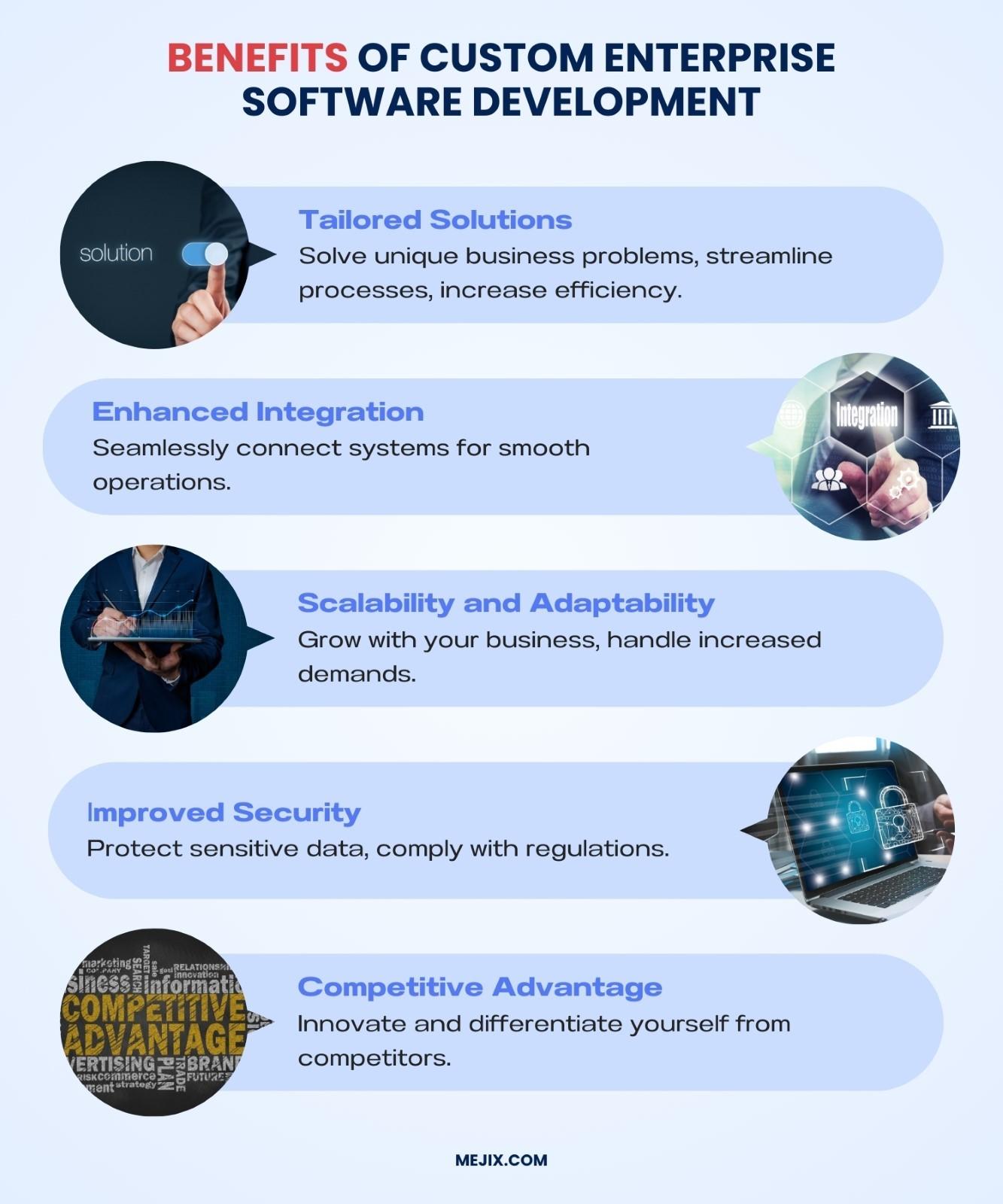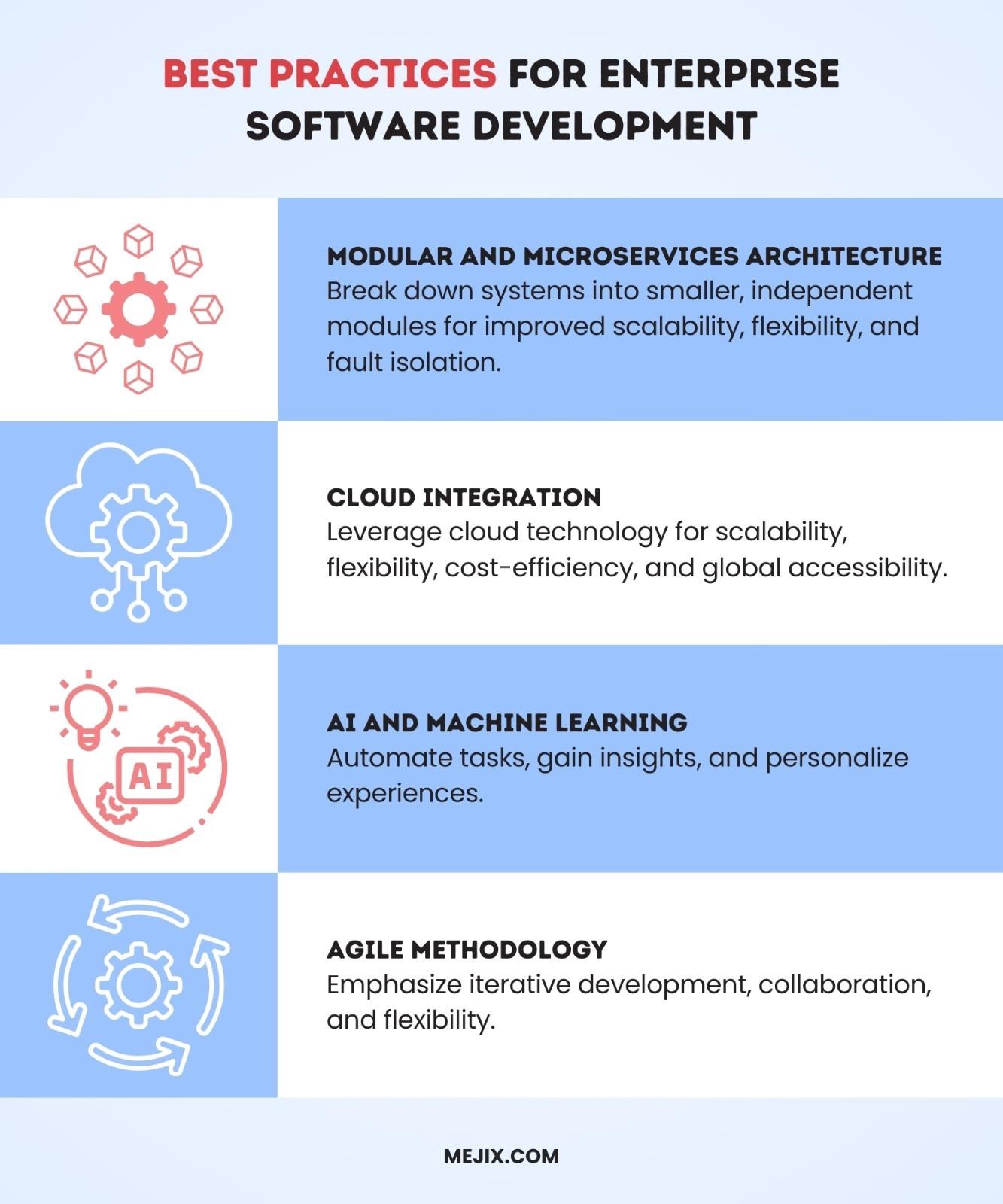Why Custom Enterprise Software Development is Key to Business Growth
Large enterprises face unique challenges when it comes to software solutions. Off-the-shelf products often fail to meet the complex needs of businesses that require advanced scalability, robust security, and seamless integration with existing systems.
Here is where custom software comes into play—it offers tailored solutions that address a business’s specific workflows and operational goals.
Today, we explore how investing in custom enterprise software development can transform your business operations and ensure long-term success.
What Is Custom Enterprise Software Development?
Custom enterprise software development refers to the process of designing, creating, and maintaining software that is tailored specifically to meet the unique needs of large organizations.
Unlike SMBs, enterprises require specialized solutions to manage complex operations. Large organizations operate with diverse teams, departments, and systems that must work together efficiently.
Enterprise Software for Your Business
Off-the-shelf software often fails to keep up with a big enterprise’s ever-changing needs or ends up costing more in the long run. In comparison, custom enterprise software offers organizations the freedom to build applications that are not only tailor-made to their specific requirements but can also anticipate potential challenges that arise with such large operations.
Technological innovations such as AI, ML, and cloud computing are boosting the market for enterprise software, and the trend is here to stay.
Types of Enterprise Software Applications

Let’s look at some of the most common types of enterprise software applications required by large businesses:
1.Enterprise Resource Planning (ERP)
ERP is a comprehensive system that manages core business functions such as accounting, procurement, and project management. ERP integrates multiple business processes into a single platform, improving data accuracy and streamlining workflows.
According to a recent report, the global ERP market is expected to reach $97.15 billion by 2028, driven by increasing demand for real-time data and operational efficiency.
2.Customer Relationship Management (CRM):
CRM software helps businesses manage customer interactions, sales leads, and customer service, enabling them to nurture and maintain customer relationships.
With an expected market size of $96.39 billion by 2027, CRM adoption continues to rise, with 65% of businesses planning to increase their CRM budgets to better manage customer interactions.
3.Supply Chain Management (SCM):
These systems manage the flow of goods and services, ensuring the efficient movement of products from suppliers to customers. SCM tools enhance visibility, optimize inventory, and improve route planning, significantly lowering operational costs and boosting efficiency.
AI can significantly benefit SCM tools, with studies reporting a potential 25% reduction in delivery times, a 35% reduction in manual labor costs, and a 12% increase in overall productivity when integrating AI in logistics management.
4.Human Resource Management (HRM):
HRM solutions manage employee data, payroll, hiring processes, and performance tracking. They are crucial for businesses aiming to enhance employee productivity and compliance with labor regulations.
A key benefit of HRM solutions is the automation of repetitive tasks, freeing HR staff to focus on more strategic activities like talent development.
5.Business Intelligence (BI):
Business Intelligence tools help organizations make data-driven decisions by analyzing vast amounts of business data to uncover trends, patterns, and insights.
Real-time data analysis allows companies to adjust their strategies quickly to respond to market changes, optimize operations, and increase profitability.
Benefits of Custom Enterprise Software Development

1. Tailored Solutions for Unique Business Needs
Custom enterprise software development offers businesses the flexibility to create solutions for their unique needs, solving issues that arise with enterprises’ complex workflows.
Custom software can be designed to streamline these processes, thus increasing efficiency and reducing manual tasks.
2. Enhanced Integration and Interoperability
Custom software can easily integrate with an enterprise’s existing systems, ensuring that all business processes work harmoniously together. This is critical for maintaining smooth operations across different finance, HR, and marketing departments.
3. Scalability and Adaptability
As enterprises grow, their operational requirements evolve. Custom enterprise software can be scaled to handle larger user bases, increased data volumes, and expanded functionality.
Well-built custom software will evolve alongside the business, helping big companies adapt to new market trends, expand into different regions, or scale up their operations more efficiently.
4. Improved Security
Security is paramount for enterprises that often deal with sensitive customer information and proprietary data. Custom software solutions can be designed to meet industry-specific regulations (e.g., HIPAA, GDPR) and include advanced security measures such as encryption, access control, and real-time monitoring.
5. Competitive Advantage
Custom software allows enterprises to innovate and respond quickly to market shifts. By developing unique tools and features that meet their specific needs, businesses can gain a competitive edge over those relying on generic solutions.
Best Practices in Enterprise Software Development

Enterprise software development has evolved significantly in recent years, driven by technological advancements and changing business needs. For effective and secure software solutions, organizations should adopt best practices that prioritize scalability, flexibility, and innovation, such as:
Modular and Microservices Architecture
One of the most critical trends in enterprise software development is the shift toward modular and microservices architectures. This approach breaks down complex systems into smaller, independent modules or services, each with its functionality and API.
Cloud Integration
Leveraging cloud technology has become essential for modern enterprise software development. Cloud-based solutions offer numerous benefits, including:
- Scalability: Easily scale resources up or down to meet changing demands.
- Flexibility: Access to a wide range of tools and services.
- Cost-Efficiency: Pay-as-you-go pricing models can reduce costs.
- Global Accessibility: Remote access and collaboration from anywhere in the world.
AI and Machine Learning
Artificial intelligence (AI) and machine learning (ML) are transforming enterprise software by automating tasks, providing insights, and optimizing processes.
Agile Methodology
Agile methodologies, such as Scrum and Kanban, have gained widespread adoption in enterprise software development. These approaches emphasize iterative development, collaboration, and flexibility, leading to improved customer satisfaction, risk mitigation, enhanced collaboration, and faster time to market.
Build Your Enterprise Software with Mejix
At Mejix, we understand how important it is for enterprises to have reliable software to support their operations and growth.
We deliver bespoke enterprise software development that aligns with your business goals. Our experienced developers, designers, and strategists work closely with you to build robust, scalable solutions that optimize your operations and propel your business forward.
Whether you’re looking to enhance existing systems or develop new ones, Mejix is here to help you transform your enterprise software for the future.
Contact us with your project, and let’s bring your vision to life!












